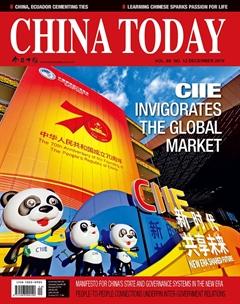Chinese Medical Market Attracts Global Players
By staff reporter DAND XIAOFEI
JOSEPH Romanelli was extremely busy dur- ing the second China International Import Expo (CIIE) in Shanghai. The global senior vice president and China region president of the U.S.-based pharmaceutical company Merck & Co., Inc. (also known as MSD) dealt with a flood of orders that came in for its new tumor immunotherapy drug PD-1 inhibitor. It has a significant therapeutic effect on tumors and attracted much interest from buyers in the medical field at the expo that took place from November 5 to 10. “Chinas medical market has huge potential, and I am very optimistic about the Chinese market,” said Romanelli.
Huge Market Potential in China
China has a population of nearly 1.4 billion people. Since its reform and opening-up kicked off, Chinese peoples average life expectancy has been rising steadily, and reached 77 in 2018, giving rise to the challenge of an aging population. According to the latest data released by the National Bureau of Statistics, by the end of 2018, there were 249 million people aged more than 60 in China, accounting for 17.9 percent of the population. In this context, China has become the second largest medical market in the world, second only to the U.S.
In the medical equipment and healthcare exhibition area of the second CIIE, foreign medical giants from all over the world brought the latest in goods and services, which caught the attention of Chinese buyers, creating millions of dollars worth of orders.
Boehringer-Ingelheim, a German pharmaceutical company, signed RMB 200 million worth of contracts with purchasers at the second CIIE. Yin Yuhan, the companys vice president of corporate communications in China, is full of confidence in the Chinese market. “In recent years, as Chinas economy has developed rapidly, peoples living standards have improved, the demand for health products has increased, and people have invested more and more in health. This provides a huge space for the growth of Chinas medical industry,” said Yin.
The outline of “Healthy China 2030” issued in 2016 predicts that the total scale of Chinas health service industry will reach RMB 16 trillion by 2030. Dai Yong, the China region vice president of Canon Medical Systems, the largest medical equipment supplier in Japan, said that with the implementation of the Healthy China plan, the countrys medical industry has ushered in a major development opportunity.“From this we can see the huge development potential of the Chinese medical market,” said Dai.
Early Ventures
MSD entered the Chinese market 30 years ago by bringing the worlds most advanced production technology of the recombinant hepatitis B vaccine to China. At present, MSD has more than 6,500 employees in China, with its headquarters in Shanghai, R&D center in Beijing and factory in Hangzhou, realizing the integration of R&D, manufacturing and commercial operation. Over the past 30 years, MSD has supplied more than 40 kinds of human medicine and vaccines to the Chinese market.
Like MSD, many foreign companies entered the Chinese market early on. Canon Medical has been in China for more than 40 years, and BoehringerIngelheim 25 years.
In 2017, China officially joined the ICH (The International Council for Harmonisation of Technical Requirements for Pharmaceuticals for Human Use) and has truly integrated into the international drug regulatory system in terms of drug registration and approval procedures. In recent years, the approval process of newly marketed drugs in China has been gradually accelerated. The Roche anti-cancer drug Alecensa, which appeared at the first CIIE last year, won approval in China nine months after it was approved in the U.S., and the first batch of prescriptions was issued in China within 47 days after its approval.
“Im very excited that the medical reform will be further deepened and accelerated, and innovation opportunities will continue to emerge. Chinas medical environment is getting increasingly better, and the company is more confident about its future development in China,” said Romanelli, noting that in the past two years, dozens of new products of MSD have been approved in China every year.
With Chinas increasingly improved medical environment, foreign enterprises are also constantly exploring new business. Boehringer-In-gelheim opened the first stroke rehabilitation center in Shanghai. “The Chinese market has a demand for high-quality stroke rehabilitation services. After a year of operation, the center is very popular, and we decided to replicate it in other cities of China,” said Yin Yuhan.
Many foreign medical companies have also begun to cooperate with Chinese enterprises. Last year, MSD and AliHealth jointly launched the strategic cooperation project of “say no to cervical cancer,” while at this CIIE, Boehringer-Ingelheim signed strategic cooperation agreements with seven local Internet hospitals, and planned to increase investment of174 million in China from 2019 to 2023. Canon Medical Systems, meanwhile, is also planning to cooperate with Chinese medical enterprises, and set up factories in China for localized production.

